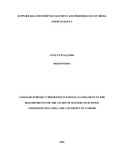| dc.description.abstract | Globalization of markets has led to divergence of customer needs, and intricacy of product components. Supply chain management efficiency has become a vital aspect in determining a firm’s competitiveness. It is known that proper supply chain management can reduce risks and uncertainty and also enhance inventory levels as well as process cycle time in order to fulfil customer needs and realise profits. For a supply chain to operate successfully, a firm’s procuring function should be appropriately measured. Notably, the importance of the procuring function rises because the procuring and outsourcing costs take a high percentage of all the aggregate costs of the production process. As a response to this outcome, firms have invested in supplier relationship management systems or SRM. This study’s objective was to determine the relationship that exists between supplier relationship management and the corporate performance of media firms in Kenya. The study population comprised 128 management staff in the four selected media firms in Kenya. Stratified research sampling was employed in determining the study’s sample size of 38. The study used primary data collected through self-administered questionnaires. The data was analyzed using descriptive statistics. The study applied regression analysis to assess the relationship between supplier relationship management versus the performance of media firms in Kenya. The study found out that supplier quality improvement enabled the companies to improve the company contract of commitment and supplier capabilities in the design, provides technical assistance to suppliers in order to improve quality of their services and integrate and improve activities. Trust-based relationships with suppliers enabled the media firms to preserve good relations, share information with suppliers, and ensure that products are delivered to the company on time. Supplier collaboration was found to have seen the media firms and the suppliers hold regular business plan meetings, operational business reviews, encourage information sharing and transparency.The usage of supplier relationship management by the media firms has resulted in reduced cycle time while ensuring that it increases company competitive positioning, improves efficiency of production operations, reduce inventory, increase market share, reduce costs, retention of customers, customer loyalty and improved customer satisfaction. The regression analysis revealed that the performance of media firms was influenced by supplier quality improvement, trust based relationships and supplier collaboration. The study recommends that the management of the media firms should adopt more supplier relationship management initiatives that would ensure that their sufficient collaboration between the two entities. Also, the media firms need to institute policies that lay emphasis on best SRM practices. | en_US |



